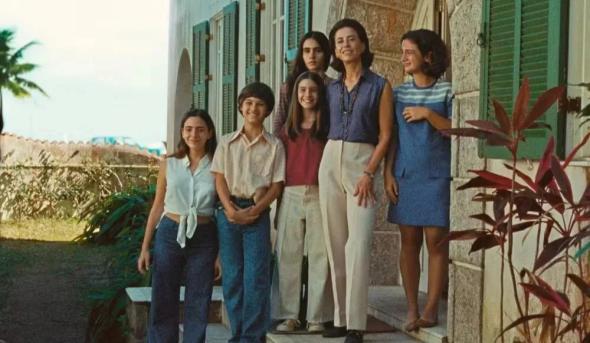We’re still here, afraid we won’t be anymore
Yesterday, at last, I’m Still Here premiered in Portugal. I followed through the Portuguese media the huge queue in the street, in the cold, outside Cinema Trindade, perhaps the first place I loved in Porto, which I neighbored for many years. I was a card-carrying member (literally) and saw so many movies, including Central Station (for the first time in theaters, at a screening commemorating the 20th anniversary of its release, when I even had the chance to meet Walter Salles). It was completely predictable that the audience of Trindade, Batalha, and any other historic theater with a curatorial focus on art cinema would fill the venue. That’s why, when they announced that tickets would go on sale, I, here in the far south, wanted to avoid places like Cinema Ideal, located at the confluence of Baixa/Chiado with Bairro Alto and Bica, with all those people pretending to be connoisseurs and ready to give their unsolicited opinions loud and clear on the way out. Instead, I opted to go to a shopping mall’s chain cinema in Almada, one of those faux fancy places where would-be madams parade around, unaware that truly rich women don’t set foot in places like that, for an afternoon session, thinking that we’d practically have a private screening. Silly me.
I entered a room full of people with whom I probably only shared a passport cover. Young people who looked like college students, entire families, elderly couples, a group of friends commenting on how they hardly manage to leave work on time. I was afraid of the chitchat, but when the movie started, it was as if the audience fell into a trance. I, who have been writing about the film since it was applauded at the last Venice Film Festival to the crowning of Fernanda Torres at the Golden Globes, who have been a reader of Marcelo Rubens Paiva since I received and read Feliz Ano Velho when I was around 14, found myself squirming and clenching my hands as I watched that young woman, happily married, mother of lovely children who were full of personality, with a life like a margarine commercial in a mansion overlooking Leblon beach at Delfim Moreira No. 80, where she lived throwing parties for her friends, see her life crumble the day they dragged her husband out of the house, without explanation, never to return.

I heard that in Brazil, a certain left-wing whiner wanted to problematize the absence of Black characters in an autobiographical work of a bourgeois family from the southern zone of Rio de Janeiro in the 70s, in a militancy so shallow that they didn’t even notice that this woman, who could’ve survived by clinging to her white privilege, instead dedicated her life to defending indigenous peoples. By the way, and for-the-love-of-God, Walter Salles is not stupid. By choosing to direct the story of a wealthy Rio family he knew exactly that he was going to convey the message that absolutely no one is immune to the repression and violence imposed by an authoritarian, antidemocratic, military regime, just like the crazies were demanding while camped out in front of the barracks after Bolsonaro’s defeat in the 2022 elections, and in the coup acts of January 8, 2023 in Brasilia.
It’s just that we’re completely used to seeing Black people and favela residents suffer. Getting fucked – No, there’s no possible euphemism here. Indigenous people, cablocos, quilombolas, ribeirinhos, peripheral populations, the bottom of the socioeconomic pyramid: society as a whole lost the ability to be shocked by human misery when it happens in places and to populations where it has been historically normalized. They are doomed to suffer. Walter Salles knows this perfectly well, being the third richest filmmaker in the world, ‘second’ only to George Lucas and Steven Spielberg, with inherited wealth of very controversial origin, bringing together Unibanco, the result of an expansion benefiting from the Brazilian dictatorship’s policy of banking centralization, with metallurgy and mining that dominate 80% of the global metal market.
Le Monde called Fernanda Torres monotonous, an adjective that says much more about the prejudices of the writer, obviously reflecting the stereotype of the loud Latin-American woman, than it does about the performance of this great artist, who managed to express the feelings of Eunice Paiva’s tragically incredible life in her most intimate expressions. A woman who saw the love of her life ripped from her home only to find herself, along with her fifteen-year-old daughter, hooded and separated on a stage of horrors to the symphony of the tortured. The scream in Fernanda Torres’ eyes is much louder.
By the way, a brief comment: it’s impossible not to compare the ending of I’m Still Here with that of Central Station, the omnipresent genius of Fernanda Montenegro set to the sound of a classic of Brazilian popular music. Before it was Preciso me encontrar by Cartola, now it’s É preciso dar um jeito, meu amigo by Erasmo Carlos. Before, a rational departure for a re-signified life, here, the unheard voice of an existence full of meanings imprisoned in a body with Alzheimer’s. Fernanda Montenegro is to Walter Salles what Marisa Paredes was to Almodóvar. It’s as if the work depended on her to be complete. And that’s fine – thankfully so.
Fifty-four years after the assassination of Rubens Paiva, we’re still here, feeling obligated to reaffirm, argue, support, and spread the message that democracy, though imperfect, is fundamental if we are to consider the possibility of a life with rights and dignity. The art of I’m Still Here is life projected onto a digital screen using Dolby Stereo and surround sound in the hope of being validated through some golden statuettes in a land that burns in flames. We’re still here, afraid we won’t be anymore, with the certainty that, for many, we were never even here. Or we shouldn’t have been.
18 January 2025 |